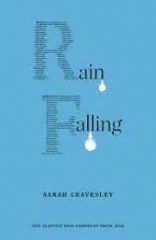Oct 24 2023
London Grip Poetry Review – Sarah Leavesley
Poetry review – RAIN FALLING: Jean Atkin adds her own high commendations to a prize-winning collection by Sarah Leavesley
Rain Falling Sarah Leavesley The Alastair Reid Pamphlet Prize 2022, Wigtown Book Festival ISBN 978-1-7394085-0-3 £7.50
Sarah Leavesley’s prize-winning pamphlet, Rain Falling, explores the beauties and the catastrophes of the world we live in now. I’d call her work luminous: there’s a lot of light in these shape-poems, while at their core, there’s a lot of loss.
The work is very much about form: each poem is in the shape of a letter, so that in the pamphlet’s entirety the poems spell out the title, one ‘letter’ to each page. Leavesley’s poems in this publication were expertly designed and typeset by Gerry Cambridge, ‘based on the author’s concept’.
The opening poem “R” (in Rain), is a tour de force. Words descend the page, each ‘rain-/ drop falling like a skipped heartbeat’. There is dreaming going on – ‘of gliding across / without leaving / a trace’. There is belief in ‘wings / of light, feathers of / snow, unmelte d/ by climate crisis.’ The poet imagines ice as ‘saving /angel’. And then the second half of the poem begins, just halfway down the shape of the R that fills the page. And in the second half, the poem reverses, its words begin to slip, they are rearranged, the same words in a different order – ‘A without / leaving, across / gliding of though…/ I dreamed, un-/ swum & wide,/ was still clean’. These rearrangements are more threatening, tangling with planetary chaos – ‘strained heart-/ beat, skipped, a like/ falling’. The poem begins with options, in the shape of ‘beginning / end’, and ends with another – ‘right /write’, which I take as art’s reason for making what contribution it can.
In the next poem, “A”, Leavesley writes with great beauty of the marvels of the earth, and of the science that we must live by. There are exact observations: ‘bindweed’s white mouths / brimmed with bowlfuls / of pure / recycled river’. Humans were once an integrated, integral part of the planet – ‘Our lungs /were still / trees’.
‘In the early days’ begins “I”, ‘hills / became hallowed /spaces’. This long, thin poem lays out our awareness of the earth, how it was once connected and meaningful within our everyday existence. In lines that are both numinous and concise, Leavesley concludes the poem: ‘We moved with / the weather, / to cool our skin / & dry our feet.’
But with “N” comes a recognisable and contemporary space. ‘Next-door planted/ tarmac, paving slabs / & cars, brick walls / & conservatory / glass’. The poem speaks of ‘our / metal / beasts’, and how ‘Fumes / fogged / everything’. We are aware of what we’ve lost – ‘We / dream/ sometimes / of mountains’, of ‘slopes/ like old hands / clasped/ in prayer’. But there are no ‘clear / answers’.
“F” begins ‘Flooding is an arc’, so connecting ideas of biblical disaster, of retribution and punishment, ‘our birth Earth… sinking’. ‘This planet’ says Leavesley, ‘is a listing / ship’ and she lists an awful rollcall of animals extinct, or about to become so.
But then the next poems surge back like a tide, to remind us once more of the wonders of the world, even as we are losing them. “A”begins ‘An amber star/ edged with black/ once rested in my / palm’ – which is the Spiny Orb-Weaver Spider. I had to look it up, and was properly astonished by this small, strange, horned creature, almost magically unlikely. And in”L”, Leavesley’s tone is heartfelt – ‘Larks are what I want / to wake up to’ – even though ‘I never/knew the / dodo’s / squeal’. There is a deep grief expressed here for all the disappearances in the world, and for just how long it’s been going on. The poem, and the planet, are ghostly with absences.
“L”(the second L in Falling) alters the tone, with a poem that launches into events that are (just and so) surreal: ‘Light that was still / naturally sourced / soon topped the / ratings for big-/gest night- / time scar- /city’ –. The poets have killed the moon, stars are bartered for love and laughter. I was reminded of how we have been faced with the unthinkable in recent years, how it keeps on happening, how we now have the feeling that nothing is off the table.
Leavesley muses over the Neolithic roots of humanity in “N”. I found this poem terrifyingly relatable. ‘No pets,/ just / walking/ food’. ‘Neolithic:/ new stone. Anthrop-/ ocene:/ defined / by humans. My sons / ache with / each day’s/ strain’. This last line must strike all parents forcefully – it is today’s children who will bear the brunt of climate crisis and all its associated disasters.
The final poem, “G”, explores how we are left with ‘part-stories with-/ out conclusions.’ Only ‘Gists remain’. As if demonstrating this, the poem disintegrates towards the end: ‘Crows slice / Light strings. Apes read’, in an echo of the tumbling words of the opening poem.
‘Letters/’ writes Leavesley, ‘have always been my only/ crop, words/ my building blocks’. Which is followed by a footnote: How weakly they stand against this climate. Yet pens are better than bombs, and words are what we turn to. They hold the line as witnesses; they can alert us and bring us together. This is beautifully-made, deeply-felt poetry. It is of real importance in these disturbing times, and I hope it will be widely read.

News…
29/10/2023 @ 09:03
[…] Jean Atkin, London Grip, full review here. […]